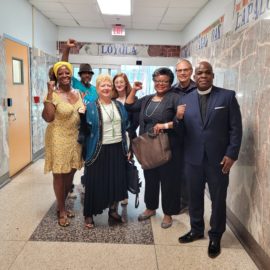
No, this is not Kansas City but this can’t be the only city in the country to have property tax sales, including possibly New Orleans. I post this not as a story we are seeing but as a warning of what might potentially happen here.
Rozetta Dotson worked two jobs to scrape together the money to pay down a delinquent tax debt on the Kansas City, Kansas, home she owns with her husband, Ricky. Then the pandemic hit, she lost her second job and Ricky got COVID-19. The Black homeowners kept paying what they could toward the taxes while waiting to talk to a judge about a new payment agreement. Then she found out her house was up for auction online. “We just felt like it was a scam, like they were trying to take our property and my husband said we felt like we were targeted, you know, because we are living in a predominantly Black neighborhood and they were doing everything they could to cause us to lose our house,” she said. The Dotsons are among those in historically Black neighborhoods in Kansas City, Kansas, who risk losing their homes amid the pandemic as delinquent property tax sales resume under a practice critics decry as racist and government officials laud for revitalizing communities. “It is a reverse redlining that is racist. And I don’t use that word a lot, but that is the only thing, I mean, it is classism and racism to socially and economically deprive people of color who live in a particular part or who have acquired a foothold in a particular part of Wyandotte County,” said state Sen. David Haley, a Black Democrat, who has tried to help some residents in his hometown keep their houses.
ABCNEWS.go.COM
Unified Government of Wyandotte County and Kansas City, Kansas realize that most of the tax sales do largely affect Black neighborhoods in a county with a population of 165,000 is about 23% Black, 30% Latino and 40% white. There are tax sales three times a year involving 2,200 properties. This is more sales than other large counties in the state. Houses can be sold after three years of non-payment of taxes. The counties goal is to put housing in “responsible hands” and to improve the visual appearance of neighborhoods.
A lot of the properties don’t sell at auction, and the county then gets them through the Wyandotte County Land Bank, a public authority that now has about 3,500 properties — nearly all of them acquired through tax foreclosures. Katherine Carttar, local director of economic development, said the county decided to be more proactive with delinquent property taxes about three years ago and to use the land bank more as a way to rebuild neighborhoods. At a virtual conference last year touting its successes, she showed slides featuring now-renovated homes and credited the program with raising property values and the county’s tax base. Critics say Wyandotte County has a disproportionately high number of delinquent tax sales compared with the rest of the state, and that the effort deprives residents of hard-fought gains in communities that for generations have faced discrimination. Wyandotte County, where 21% of residents live in poverty, has whole city blocks of foreclosed property for future redevelopment. Displaced property owners get no compensation, Haley noted. Carttar says most properties in the land bank have been long abandoned. The upcoming online delinquent tax sale lists 43% of properties as vacant.
This program has the backdrop of the inequalities of the gap between Black and White individuals. Home ownership is the “first rung of the wealth building ladder” says Chuck Collins, director of the Program on Inequality and the Common Good at the Institute for Policy Studies, a progressive research group.
Nearly 72% of white Americans owned their own homes in 2017, compared with just slightly more than 42% of Black families, according to the U.S. Census Bureau. “Here we are during a pandemic where the racial impact of the pandemic has not been equal. It has been disproportionately borne by Black and brown people and there is a huge risk of evictions and foreclosures coming out of the pandemic once the various moratoriums are lifted,” Collins said. “So it might be a time not to pursue aggressive tax sales.” The two Black county commissioners who represent neighborhoods hard hit by the sales did not respond to interview requests from The Associated Press.
In this case, the fact the house was on the tax sale list was noted and the homeowners came to pay off the tax lien of $2300 on the date of the sale only to be told it was too late. They got the home back but has to pay a total of $5200 as they had to deal with the lawyers of the real estate agency that bought the house.
Haley successfully warned another Black resident, Karen Pitchford-Knox, that the house where she’d grown up was on the auction block this January. When Pitchford-Knox’s mom died in 2016, she inherited the house as well as more than $5,000 in delinquent property taxes. She got behind on her payment plan after losing her job during the pandemic. Pitchford-Knox had about two weeks to — as she put it — “beg, borrow and steal from Peter and Paul” the $1,000 for the taxes. “I most definitely do feel they are targeting Black homes,” she said, noting she knew three other Black women whose homes were on auction lists. “I feel it is like Black female homeowners and Black seniors.”
We bought our house from a developer who bought the house after a grandmother got a reverse mortgage and did not tell her daughter. When the grandmother died the house went to the bank who sold it. The house was renovated from a double shotgun to a single home and we paid far more than the daughter could afford. Not the same circumstances but similar one where a Black family lost the house so a White family could move in. Or in this case, where a low income lost out to a higher income.


